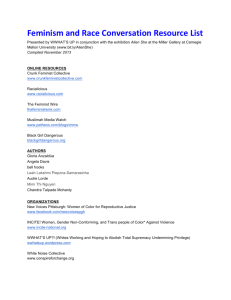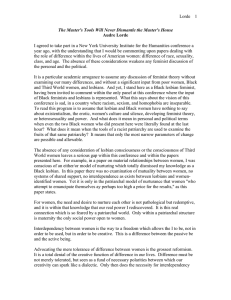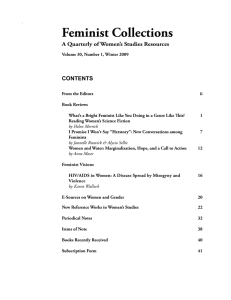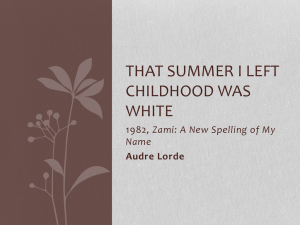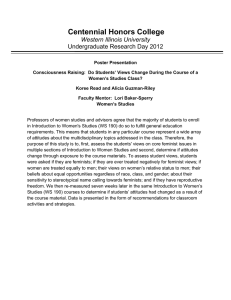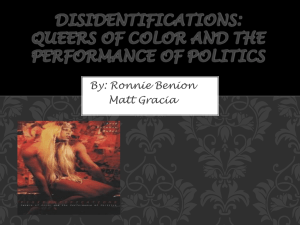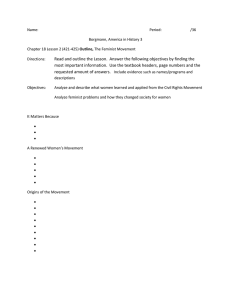Lorde Audre 1983 The Masters Tools Will Never Dismantle the Masters House
advertisement
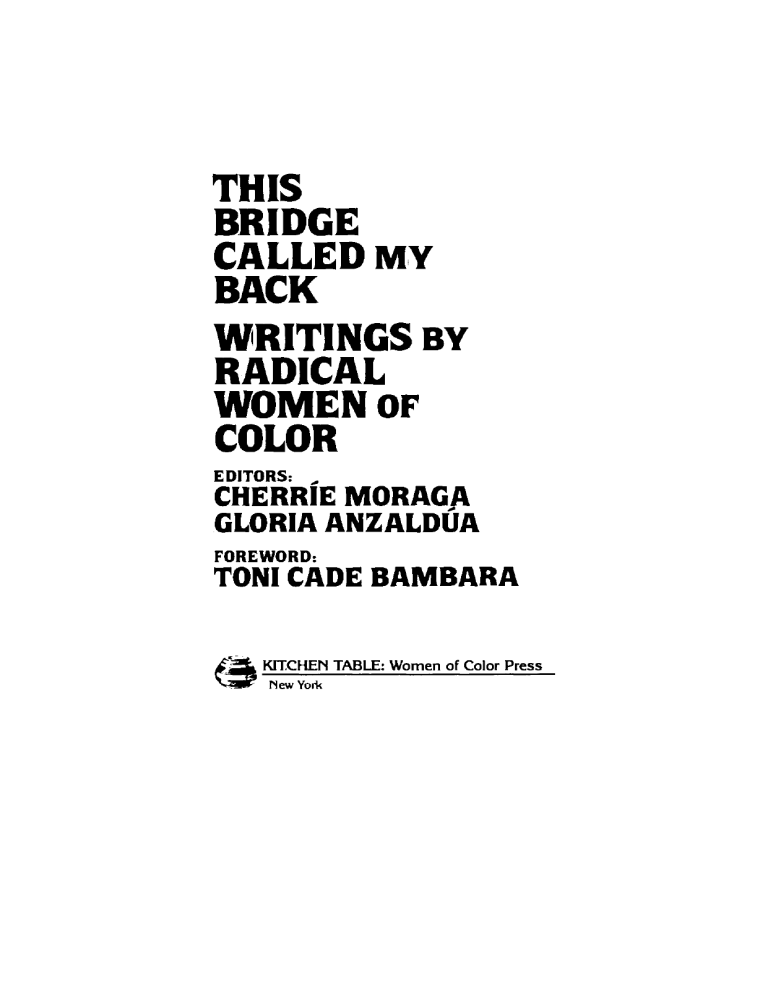
THIS BRIDGE CALLED MY BACK WRITINGS BY RADICAL WOMEN OF COLOR EDITORS: _ CHERRIE MORAGA GLORIA ANZALDUA FOREWORD: TONI CADE BAMBARA a KITCHEN TABLE: Women of Color Press New York Copyright © 198 L 1983 by Cherrie Moraga and Gloria Anzaldua. All rights reserved. No part of this book may be reproduced without permission in writing from the publisher. Published in the United States by Kitchen Table: Women of Color Press, Post Office Box 908, Latham, New York 12110-0908. Originally published by Peresphone Press, Inc. Watertown, Massachusetts, 1981. Also by Cherrie M o r a g a Cuentos: Stories by Latinas, ed. with Alma Gomez and M a r i a n a R o m o - C a r m o n a . Kitchen Table: Women of Color Press, 1983. Loving in the War Years: Lo Que Nunca Paso Por Sus Labios. S o u t h End Press, 1983. Cover and text illustrations by J o h n e t t a Tinker. Cover design by Maria von Brincken. Text design by Pat McGloin. Typeset in G a r t h Graphic by Serif & Sans, Inc., Boston, Mass. Second Edition Typeset by Susan L. Yung Second Edition, Sixth Printing. ISBN 0-913175-03-X, paper. ISBN 0-913175-18-8, cloth. This bridge called my back : writings by radical women of color / editors, Cherrie Moraga, Gloria Anzaldua ; foreword, Toni Cade Bambara. — 1st ed. — Watertown, Mass. : Persephone Press, cl981.[*] x x v i , 261 p. : ill. ; 22 c m . Bibliography: p. 251-261. I S B N 0 - 9 3 0 4 3 6 - 1 0 - 5 (pbk.) : S9.95 1. Feminism—Literary collections. 2. Radicalism—Literary collections. 3. Minority w o m e n — U n i t e d States—Literary collections. 4. America n literature —Women authors. 5. A m e r i c a n literature—Minority authors. 6. A m e r i c a n literature—20th century. I. Moraga, Cherrie II. A n z a l d u a , Gloria. PS509.F44T5 810 '.8 '09287—dcl9 81-168894 AACR 2 Library of C o n g r e s s MARC [r88]rev [*]—2nd ed. — Latham, NY: Kitchen Table, Women of Color Press, cl983. C H R Y S T O S : " C e r e m o ny for Completing a Poetry Reading," copyright © 1976 by Chrystos, first appeared in Wotnanspirit, reprinted by permission. C O M B A H E E RIVER COLLECTIVE: "A Black Feminist Statement, " first appeared in Capitalist Patriarchy and the Case for Socialist Feminism, Zillah R. Eisenstein, ed. (New York: Monthly Review Press, 1979), reprinted by permission. D O R I S D A V E N P O R T : "The Pathology of Racism," copyright © 1980 by Doris Davenport, first appeared in Spinning O f f . reprinted by permission. HATTIE GOSSETT:"billie lives! billielives! " c o p y r i g h t © 1980 by Hattie Gossett; "who told you anybody wants t o hear f r o m you? you ain't nothing but a black w o m a n ! , " copyright © 1980 by Hattie Gossett. M A R Y H O P E LEE: "on not being," copyright © 1979 by Mary H o p e Lee, first appeared in Callaloo, reprinted by permission. A U D R E LORDE: "An O p e n Letter to Mary Daly," copyright © 1980 by Audre Lorde, first appeared in Top Ranking, reprinted by permission. " T h e Master's Tools Will Never Dismantle the Master's House," copyright © 1980 by Audre Lorde. PAT PARKER: "Revloution: It's Not Neat or Pretty or Quick," copyright © 1980 by Pat Parker. KATE R U S H I N . " T h e Bridge P o e m, copyright © 1981 by D o n n a K. Rushin. M I T S L Y E Y A M A D A : "Invisibility is an U n n a t u r a l Disaster," copyright © 1979 by Bridge: An Asian American Perspective, reprinted by permission. "Gee, You Don't Seem Like An Indian From the Reservation" Barbara Cameron " . . . And Even Fidel Can't Change That!" Aurora Levins Morales I Walk in the History of My People Chrystos 46 53 57 And When You Leave, Take Your Pictures With You Racism in the Women's Movement And When You Leave, Take Your Pictures With You Jo Carrillo Beyond the Cliffs of Abiquiu Jo Carrillo I Don't Understand Those Who Have Turned Away From Me Chrystos Asian Pacific American Women and Feminism Mitsuye Yamada Millicent Fredericks Gabrielle Daniels " - But I Know You, American Woman" Judit Moschkovich The Pathology of Racism: A Conversation with Third World Wimmin doris davenport We're All in the Same Boat Rosario Morales An Open Letter to Mary Daly Audre Lorde The Master's Tools Will Never Dismantle the Master's House Audre Lorde 63 65 68 71 76 79 85 91 94 98 Between the Lines On Culture, Class, and Homophobia The Other Heritage Rosario Morales billie lives! billie lives! hattie gossett Across the Kitchen Table: A Sister-to-Sister Dialogue Barbara Smith and Beverly Smith 107 109 113 98 The Master's Tools Will Never Dismantle The Master's House Comments at"The Personal and the Political" Panel (Second Sex Conference, October 29, 1979) Audre Lorde I agreed to take part in a New York University Institute for the Humanities conference a year ago, with the understanding that I would be commenting upon papers dealing with the role of difference within the lives of american women; difference of race, sexualitv. class, and age. For the absence of these considerations weakens any feminist discussion of the personal and the political. It is a particular academic arrogance to assume any discussion of feminist theory in this time and in this place without examining our many differences, and without a significant input from poor women, black and third-world women, and lesbians. And yet, I stand here as a black lesbian feminist, having been invited to comment within the only panel at this conference where the input of black feminists and lesbians is represented. What this says about the vision of this conference is sad, in a country where racism, sexism and homophobia are inseparable. To read this progam is to assume that lesbian and black women have nothing to say of existentialism, the erotic, women's culture and silence, developing feminist theory, or heterosexuality and power. And what does it mean in personal and political terms when even the two black women who did present here were literally found at the last hour? What does it mean when the tools of a racist patriarchy are used to examine the fruits of that same patriarchy'/ It means that only the most narrow perimeters of change are possible and allowable. The absence of any consideration of lesbian consciousness or the consciousness of third world women leaves a serious gap within this conference and within the papers presented here. For example, in a paper on material relationships between women, I was conscious of an either/or model of nurturing which totally dismissed my knowledge as a black lesbian. In this paper there was no examination ot mutuality between women, no systems of shared support, no interdependence as exists between lesbians and women-identified women. Yet it is only in the patriarchal model of nurturance that women "who attempt to emancipate themselves pay perhaps too high a price for the results," as this paper states. For women, the need and desire to nurture each other is not pathological but redemptive, and it is within that knowledge that our real A udre Lorde 99 power is rediscovered. It is this real connection, which is so feared by a patriarchal world. For it is only under a patriarchal structure that maternity is the only social power open to w o m e n. Interdependency between women is the only way to the freedom which allows the T to "be", not in order to be used, but in order to be creative. This is a difference between the passive "be" and the active "being." Advocating the mere tolerance of difference between wome n is the grossest reformism. It is a total denial of the creative function of difference in our lives. For difference must be not merely tolerated, but seen as a fund of necessary polarities between which our creativity can spark like a dialectic. Only then does the necessity for interdependency become unthreatening. Only within that interdependency of different strengths, acknowleged and equal, can the power to seek new ways to actively "be" in the world generate, as well as the courage and sustenance to act where there are no charters. Within the interdependence of mutual (non-dominant) differences lies that security which enables us to descend into the chaos of knowledge and return with true visions of our future, along with the concomitant power to effect those changes which can bring that future into being. Difference is that raw and powerful connection from which our personal power is forged. As women, we have been taught to either ignore our differences or to view them as causes for separation and suspicion rather than as forces for change. Without community, there is no liberation, only the most vulnerable and temporary armistice between an individual and her oppression. But community must not mean a shedding of our differences, nor the pathetic pretense that these differences do not exist. Those of us who stand outside the circle of this society's definition of acceptable women; those of us w h o have been forged in the crucibles of difference; those of us who are poor, who are lesbians, who are black, who are older, know that survival is fiot an academic skill. It is learning how to stand alone, unpopular and sometimes reviled, and how to make common cause with those other identified as outside the structures, in order to define and seek a world in which we can all flourish. It is learning how to take our differences and make them strengths. For the master's tools will never dismantle the master's house. They may allow us temporarily to beat him at his own game, but they will never enable us to bring about genuine change. And this fact is only threatening to those Women w h o still define the master's house as their only source of support. Poor and third world w o m e n know there is a difference between the daily manifestations and dehumanizations of marital slavery and prostitution, because it is our daughters w h o line 42nd Street. The 100 Black panelists' observation about the effects of relative powerless ness and the differences of relationship between black women and men from white w o m e n and men illustrate some of our unique problems as black feminists. If white american feminist theory need not deal with the differences between us, and the resulting difference in aspects of our oppressions, then what do you do with the fact that the w o m e n w h o clean your houses and tend your children while you attend conferences on feminist theory are, for the most part, poor and third world w o m e n ? What is the theory behind racist feminism? In a world of possibility for us all, our personal visions help lay the groundwork for political action. The failure of the academic feminists to recognize difference as a crucial strength is a failure to reach beyond the first patriarchal lesson. Divide and conquer, in our world must become define and empower. Why weren't other black women and third world women found to participate in this conference? Why were two phone calls to me considered a consultation? Am I the only possible source of names of black feminists? And although the black panelist's paper ends on a important and powerful connection of love between women, what about interracial co-operation between feminists w h o don't love each other? In academic feminist circles, the answer to these questions is often "We did not know w h o to ask." But that is the same evasion of responsibility, the same cop-out, that keeps black women's art out of women's exhibitions, black women's work out of most feminist publications except for the occasional "Special Third World Women's Issue,"* and black women's texts off of your reading lists. But as Adrienne Rich pointed out in a recent talk, white feminists have educated themselves about such an enormous amount over the past ten years, how come you haven't also educated yourselves about black w o m e n and the differences between us - white and black - when it is key to our survival as a movement? Women of today are still being called upon to stretch across the gap of male ignorance, and to educate men as to our existence and our needs. This is an old and primary tool of all oppressors to keep the oppressed occupied with the master's concerns. Now we hear that it is the task of black and third world w o m e n to educate white women, in the face of tremendous resistance, as to our existence, our differences, our relative roles in our joint survival. This is a diversion of energies and a tragic repetition of racist patriarchal thought. *Conditions of Brooklyn, NY is a major exception. It has fairly consistently published the w o r k of w o m e n of color before it w a s "fashionable'' to do so. [editor's footnote* Audre Lorde 101 Simone DeBeauvoir once said: "It is in the knowledge of the genuine conditions of our lives that we must draw our strength to live and our reasons for acting." Racism and homophobia are real conditions of all our lives in this place and this time. I urge each one of us here to reach down into that deep place of knowledge inside herself and touch that terror and loathing of any difference that lives there. See whose face it wears. Then the personal as the political can begin to illuminate all our choices.
